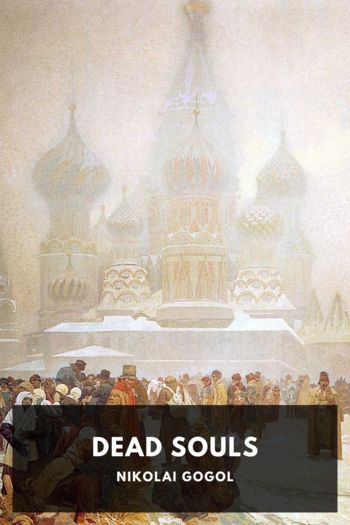Short Fiction - Nikolai Gogol (best selling autobiographies TXT) 📗

- Author: Nikolai Gogol
Book online «Short Fiction - Nikolai Gogol (best selling autobiographies TXT) 📗». Author Nikolai Gogol
Thus speaking, the artist suddenly shuddered, and turned pale. A convulsively distorted face gazed at him, peeping forth from the surrounding canvas; two terrible eyes were fixed straight upon him; on the mouth was written a menacing command of silence. Alarmed, he tried to scream and summon Nikita, who already was snoring in the anteroom; but he suddenly paused and laughed. The sensation of fear died away in a moment; it was the portrait he had bought, and which he had quite forgotten. The light of the moon illuminating the chamber had fallen upon it, and lent it a strange likeness to life.
He began to examine it. He moistened a sponge with water, passed it over the picture several times, washed off nearly all the accumulated and incrusted dust and dirt, hung it on the wall before him, wondering yet more at the remarkable workmanship. The whole face had gained new life, and the eyes gazed at him so that he shuddered; and, springing back, he exclaimed in a voice of surprise: “It looks with human eyes!” Then suddenly there occurred to him a story he had heard long before from his professor, of a certain portrait by the renowned Leonardo da Vinci, upon which the great master laboured several years, and still regarded as incomplete, but which, according to Vasari, was nevertheless deemed by all the most complete and finished product of his art. The most finished thing about it was the eyes, which amazed his contemporaries; the very smallest, barely visible veins in them being reproduced on the canvas.
But in the portrait now before him there was something singular. It was no longer art; it even destroyed the harmony of the portrait; they were living, human eyes! It seemed as though they had been cut from a living man and inserted. Here was none of that high enjoyment which takes possession of the soul at the sight of an artist’s production, no matter how terrible the subject he may have chosen.
Again he approached the portrait, in order to observe those wondrous eyes, and perceived, with terror, that they were gazing at him. This was no copy from Nature; it was life, the strange life which might have lighted up the face of a dead man, risen from the grave. Whether it was the effect of the moonlight, which brought with it fantastic thoughts, and transformed things into strange likenesses, opposed to those of matter-of-fact day, or from some other cause, but it suddenly became terrible to him, he knew not why, to sit alone in the room. He draw back from the portrait, turned aside, and tried not to look at it; but his eye involuntarily, of its own accord, kept glancing sideways towards it. Finally, he became afraid to walk about the room. It seemed as though someone were on the point of stepping up behind him; and every time he turned, he glanced timidly back. He had never been a coward; but his imagination and nerves were sensitive, and that evening he could not explain his involuntary fear. He seated himself in one corner, but even then it seemed to him that someone was peeping over his shoulder into his face. Even Nikita’s snores, resounding from the anteroom, did not chase away his fear. At length he rose from the seat, without raising his eyes, went behind a screen, and lay down on his bed. Through the cracks of the screen he saw his room lit up by the moon, and the portrait hanging stiffly on the wall. The eyes were fixed upon him in a yet more terrible and significant manner, and it seemed as if they would not look at anything but himself. Overpowered with a feeling of oppression, he decided to rise from his bed, seized a sheet, and, approaching the portrait, covered it up completely.
Having done this, he lay done more at ease on his bed, and began to meditate upon the poverty and pitiful lot of the artist, and the thorny path lying before him in the world. But meanwhile his eye glanced involuntarily through the joint of the screen at the portrait muffled in the sheet. The light of the moon heightened the whiteness of the sheet, and it seemed to him as though those terrible eyes shone through the cloth. With terror he fixed his eyes more steadfastly on the spot, as if wishing to convince himself that it was all nonsense. But at length he saw—saw clearly; there was no longer a sheet—the portrait was quite uncovered, and was gazing beyond everything around it, straight at him; gazing as it seemed fairly into his heart. His heart grew cold. He watched anxiously; the old man moved, and suddenly, supporting himself on the frame with both arms, raised himself by his hands, and, putting forth both feet, leapt out of the frame. Through the crack of the screen, the empty frame alone was now visible. Footsteps resounded through the room, and approached nearer and nearer to the screen. The poor artist’s heart began beating fast. He expected every moment, his breath failing for fear, that the old man would look round the screen at him. And lo! he did look from behind the screen, with the very same





Comments (0)